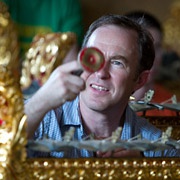Evan Ziporyn: Frog's Eye

Frog's Eye
Evan Ziporyn, composer
Performed by the Boston Modern Orchestra Project
Cantaloupe Records, 2006
"I'm quite convinced in some ways that the camera has given us a somewhat blinkered look. We're looking at the world through a hole—we're getting a bit of tunnel vision. And so I'm trying to widen it, trying to put in more than just looking ahead. And when you do, the viewer is pulled in more. So I get quite excited by that. I spent rather a long time experimenting with optics, and actually now my intention is to throw them away and use my two eyes and what I think of the world and look at it, look at the real world. I don't watch television much, I look at the garden, that's the real world I think, so that's what I'm going to do."
— David Hockney, NPR Weekend Edition
Composer's note
"This piece was inspired by a particular frog, in a particular pond on a particularly hot New England summer day. Swimming across a pond in the rampant fecundity of such a summer day, dwarfed by water and sky, ringed by trees and leaves, a body can feel small and unimportant—but also wondrously alive.
"As it turns out, this is close to the frog's-eye view: perched on a rock in shallow water, 99 percent immersed, only its huge panoptic eyes above the water line. Perfect stillness, perfect contemplation, patience, serenity, all that good Zen stuff. Keeping cool while maintaining absolute vigilance.
"He was in fact hard at work, staring intently, waiting for a moment of action and violence, for insects, for food. The view was incidental as far as he was concerned. Meanwhile, back among the humans, we live our directed lives, cutting across the sensory present, intersecting with it, ignoring it, misapprehending, misinterpreting. This is undoubtedly our own biological necessity. We strive for a certain type of awareness, for multilayered perception, and occasionally we get there, but we seem to be built for subjective narrative. We've got to catch the fly to survive. I personally don't have a problem with this, but—like Mr. Hockney—I'm trying to look at my surroundings while still advancing the story line."